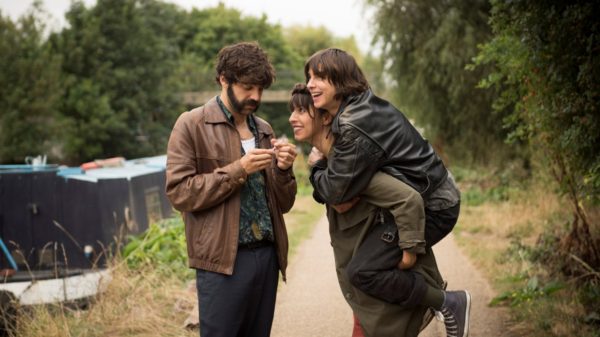Romantic dramas might be dime and dozen in the indie world, but its still rare to see one that tackles the lives of those outside of the status quo. For this reason alone, Anchor & Hope is refreshing in its commitment to unpicking the complicated business of living unconventional lives.
Eva (Oona Chaplin) and Kat (Natalia Tena) are a couple who, aside from their recently departed pet cat Chorizo, are happy with their laid-back existence living on a canal boat and working part-time as a salsa teacher and bartender, respectively. But when Eva decides that she wants a baby, and Kat drunkenly agrees to them using her visiting friend from Barcelona, Roger’s (David Verdaguer), sperm to do so, the situation becomes much more complicated.
Anchor & Hope premiered at London Film Festival 2017 and, just as the festival readies itself for another go-around, the film hit select cinemas around the UK over the weekend.
Naturalistic and honest throughout, the film benefits from pitch-perfect performances from its central cast. The chemistry between Chaplin and Tena is palpable, and its this connection that allows the film to float – pun intended – for as long as it does. Unfortunately, it also fails to really get going with its concept, with the fascinating dynamic between its three key players never really reaching its potential.
There’s a few moments where you can really see how complicated and uncomfortable three-person parenting could get, but the film really stands out when it’s challenging the pre-conceived notions that the supporting characters and much of the audience would enter such a situation with.
The moment in which Kat stands up to Eva’s mother (Geraldine Chaplin), rejecting her heteronormative ideas about parenting, is a notable moment in an otherwise quiet film simply because it has something definite to say. Otherwise, Anchor & Hope appears unconcerned with any larger meaning and content with simply following its characters as they stumble through their self-made chaos.
Essentially, their story is about deciding what queer people should or shouldn’t keep and discard from a heterosexual society, and that sometimes it’s about individual choice based on circumstance and the priorities of a particular couple (or throuple).
Ultimately the film hops along much like the barge itself – smooth, calming, free but often frustratingly slow to get anywhere. Still, it’s hard not to have a soft spot for a film that chooses hope over heartbreak, and personality over tradition.

